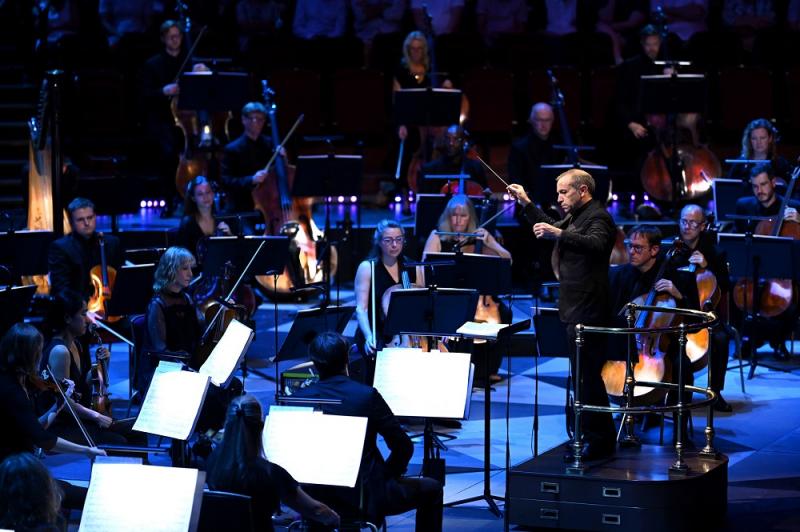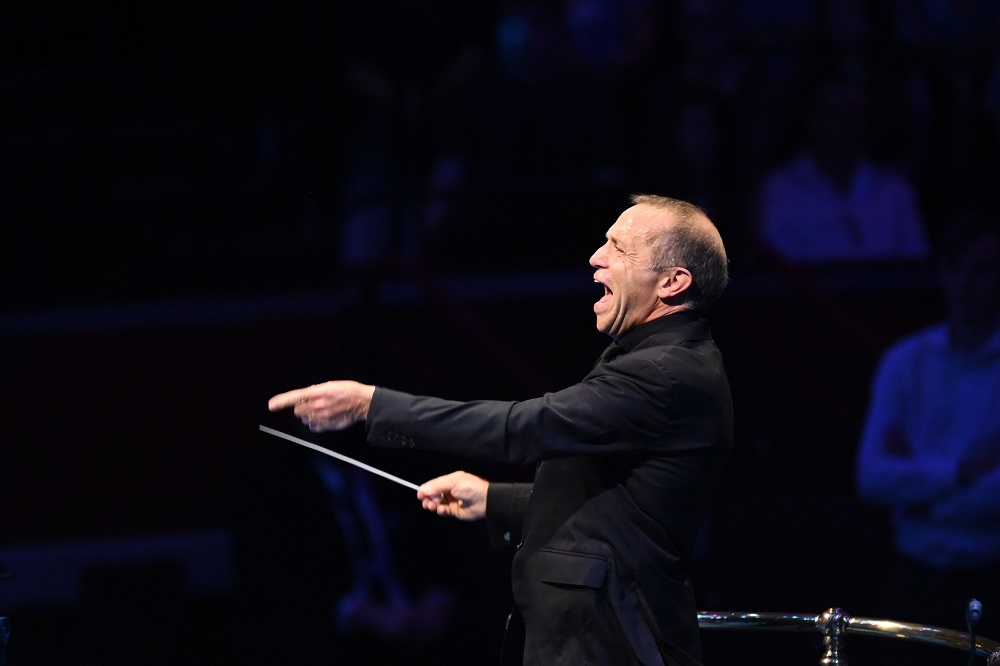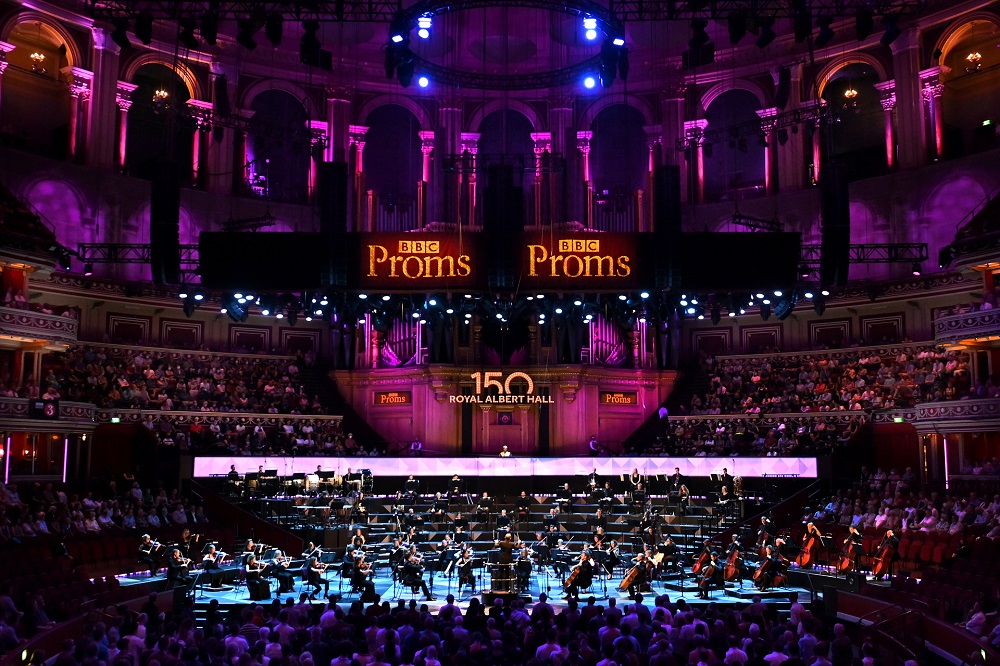Proms Festival Orchestra, Wigglesworth, BBC Proms review - brilliant work in progress, perfect Adagietto | reviews, news & interviews
Proms Festival Orchestra, Wigglesworth, BBC Proms review - brilliant work in progress, perfect Adagietto
Proms Festival Orchestra, Wigglesworth, BBC Proms review - brilliant work in progress, perfect Adagietto
Freelance musicians prove an army of generals, marshalled by a great British conductor

You don’t expect a great orchestral string section to be born overnight, yet under the circumstances of the Proms Festival Orchestra’s rapid creation and only three rehearsals of three hours each, this was more than good, with detailed articulation demanded and delivered.
What a cause for celebration beyond the sheer feat of freelance musicians coming together, many after a long performing silence (which also meant, mostly, Mahler’s too). What we should perhaps call “the Mark Wigglesworth Mahler Fifth” (the conductor pictured below) knew its mind from the start, moved decisively and often rapidly, hit the high points with infallible brilliance and brought a vintage roar with footstamping from a very full Albert Hall, including a packed arena (by which stage you just had to forget the worry that only roughly five per cent of people in the hall were wearing facemasks; we know now that simply producing a vaccine certificate at the door doesn’t prevent infection).  The coruscating, joyful craziness of Mahler’s finale pre-empts an encore, so they played that first in the shape of Shostakovich’s Festive Overture, Eric Coates on steroids. Well-defined raciness followed fanfares from the most brilliant trumpet section I’ve heard at the Proms this year – major-key grandeur to be offset the lone funeral celebrant at the beginning of the symphony. It’s worth repeating that Mahler’s opening solo tells you a lot about the performance to come, and Chris Evans’ delivery certainly did: dazzlingly full, taut rhythms, fearlessness on reaching the big blaze.
The coruscating, joyful craziness of Mahler’s finale pre-empts an encore, so they played that first in the shape of Shostakovich’s Festive Overture, Eric Coates on steroids. Well-defined raciness followed fanfares from the most brilliant trumpet section I’ve heard at the Proms this year – major-key grandeur to be offset the lone funeral celebrant at the beginning of the symphony. It’s worth repeating that Mahler’s opening solo tells you a lot about the performance to come, and Chris Evans’ delivery certainly did: dazzlingly full, taut rhythms, fearlessness on reaching the big blaze.
This was really the brass’s evening; the horn section, too, was hyper-brilliant, with an infallible obbligato solo from Laurence Davis in the tumbling central Scherzo ("the world without gravity," Mahler dubbed it). If the wind made less of an impact, that had a lot to do with Mahler’s priorities in this symphony, such a different world from the Fourth, which up to this point was the only one of the nine possible under Covid restrictions, in an equally riveting interpretation from Robin Ticciati and the London Philharmonic Orchestra at Glyndebourne. Are Ticciati, Pappano and Wigglesworth our finest conductors in this beleaguered but still, no thanks to what's happened recently, musically magnificent island? Everything they’ve done in recent years suggests so.  Wigglesworth dared much in his urgent driving forward where necessary. It kept at bay the usual sense of flatulence in the second movement – companion-piece to the funeral march, revisiting its music in some especially poignant, refined playing here from the PFO cellos. You felt that perhaps the madcap acrobatics that follow the Scherzo’s first twilight zone carried on infecting the rest of the movement, not all of which has to feel so dangerous. But the Adagietto was, in my books, as perfect tempo- and flexibility-wise as Ticciati’s account of the Tristan Prelude earlier in the Proms (I didn't sit there with a stopwatch at the performance, but radio revisit revealed it clocks in at nine minutes - something of a golden mean when the timings can range from seven to 18). This may not be the deepest-digging string section as yet, as a slight lack of ballast in the first-movement welters indicated, but it can manage the right inwardness, while clarity in the fugal riots of the finale was impressive indeed. And yes, the Proms audience’s reaction to the last tumble took us all back to the great events of previous years. No Vienna or Berlin Philharmonics this year, but so much commitment and quality from our own players at every turn.
Wigglesworth dared much in his urgent driving forward where necessary. It kept at bay the usual sense of flatulence in the second movement – companion-piece to the funeral march, revisiting its music in some especially poignant, refined playing here from the PFO cellos. You felt that perhaps the madcap acrobatics that follow the Scherzo’s first twilight zone carried on infecting the rest of the movement, not all of which has to feel so dangerous. But the Adagietto was, in my books, as perfect tempo- and flexibility-wise as Ticciati’s account of the Tristan Prelude earlier in the Proms (I didn't sit there with a stopwatch at the performance, but radio revisit revealed it clocks in at nine minutes - something of a golden mean when the timings can range from seven to 18). This may not be the deepest-digging string section as yet, as a slight lack of ballast in the first-movement welters indicated, but it can manage the right inwardness, while clarity in the fugal riots of the finale was impressive indeed. And yes, the Proms audience’s reaction to the last tumble took us all back to the great events of previous years. No Vienna or Berlin Philharmonics this year, but so much commitment and quality from our own players at every turn.
rating
Share this article
Add comment
The future of Arts Journalism
You can stop theartsdesk.com closing!
We urgently need financing to survive. Our fundraising drive has thus far raised £49,000 but we need to reach £100,000 or we will be forced to close. Please contribute here: https://gofund.me/c3f6033d
And if you can forward this information to anyone who might assist, we’d be grateful.

Subscribe to theartsdesk.com
Thank you for continuing to read our work on theartsdesk.com. For unlimited access to every article in its entirety, including our archive of more than 15,000 pieces, we're asking for £5 per month or £40 per year. We feel it's a very good deal, and hope you do too.
To take a subscription now simply click here.
And if you're looking for that extra gift for a friend or family member, why not treat them to a theartsdesk.com gift subscription?
more Classical music
 Bizet in 150th anniversary year: rich and rare French offerings from Palazzetto Bru Zane
Specialists in French romantic music unveil a treasure trove both live and on disc
Bizet in 150th anniversary year: rich and rare French offerings from Palazzetto Bru Zane
Specialists in French romantic music unveil a treasure trove both live and on disc
 Scottish Chamber Orchestra, Ibragimova, Queen’s Hall, Edinburgh review - rarities, novelties and drumrolls
A pity the SCO didn't pick a better showcase for a shining guest artist
Scottish Chamber Orchestra, Ibragimova, Queen’s Hall, Edinburgh review - rarities, novelties and drumrolls
A pity the SCO didn't pick a better showcase for a shining guest artist
 Kilsby, Parkes, Sinfonia of London, Wilson, Barbican review - string things zing and sing in expert hands
British masterpieces for strings plus other-worldly tenor and horn - and a muscular rarity
Kilsby, Parkes, Sinfonia of London, Wilson, Barbican review - string things zing and sing in expert hands
British masterpieces for strings plus other-worldly tenor and horn - and a muscular rarity
 From Historical to Hip-Hop, Classically Black Music Festival, Kings Place review - a cluster of impressive stars for the future
From quasi-Mozartian elegance to the gritty humour of a kitchen inspection
From Historical to Hip-Hop, Classically Black Music Festival, Kings Place review - a cluster of impressive stars for the future
From quasi-Mozartian elegance to the gritty humour of a kitchen inspection
 Shibe, LSO, Adès, Barbican review - gaudy and glorious new music alongside serene Sibelius
Adès’s passion makes persuasive case for the music he loves, both new and old
Shibe, LSO, Adès, Barbican review - gaudy and glorious new music alongside serene Sibelius
Adès’s passion makes persuasive case for the music he loves, both new and old
 Anja Mittermüller, Richard Fu, Wigmore Hall review - a glorious hall debut
The Austrian mezzo shines - at the age of 22
Anja Mittermüller, Richard Fu, Wigmore Hall review - a glorious hall debut
The Austrian mezzo shines - at the age of 22
 First Person: clarinettist Oliver Pashley on the new horizons of The Hermes Experiment's latest album
Compositions by members of this unusual quartet feature for the first time
First Person: clarinettist Oliver Pashley on the new horizons of The Hermes Experiment's latest album
Compositions by members of this unusual quartet feature for the first time
 Gesualdo Passione, Les Arts Florissants, Amala Dior Company, Barbican review - inspired collaboration excavates the music's humanity
At times it was like watching an anarchic religious procession
Gesualdo Passione, Les Arts Florissants, Amala Dior Company, Barbican review - inspired collaboration excavates the music's humanity
At times it was like watching an anarchic religious procession
 Classical CDs: Camels, concrete and cabaret
An influential American composer's 90th birthday box, plus British piano concertos and a father-and-son duo
Classical CDs: Camels, concrete and cabaret
An influential American composer's 90th birthday box, plus British piano concertos and a father-and-son duo
 Cockerham, Manchester Camerata, Sheen, Martin Harris Centre, Manchester review - re-enacting the dawn of modernism
Two UK premieres added to three miniatures from a seminal event of January 1914
Cockerham, Manchester Camerata, Sheen, Martin Harris Centre, Manchester review - re-enacting the dawn of modernism
Two UK premieres added to three miniatures from a seminal event of January 1914
 Kempf, Brno Philharmonic, Davies, Bridgewater Hall, Manchester review - European tradition meets American jazz
Bouncing Czechs enjoy their Gershwin and Brubeck alongside Janáček and Dvořák
Kempf, Brno Philharmonic, Davies, Bridgewater Hall, Manchester review - European tradition meets American jazz
Bouncing Czechs enjoy their Gershwin and Brubeck alongside Janáček and Dvořák
 Solomon, OAE, Butt, QEH review - daft Biblical whitewashing with great choruses
Even a top soprano and mezzo can’t make this Handel paean wholly convincing
Solomon, OAE, Butt, QEH review - daft Biblical whitewashing with great choruses
Even a top soprano and mezzo can’t make this Handel paean wholly convincing

Comments
It’s worth noting that the
16 would be best, but 12
16 would be best, but 12 first violins isn't exactly 'heavily reduced'. But I take your general point.
Hmmm, take Abbado with the
Your point about the brass
Your point about the brass-heavy nature of the symphony is certainly valid.